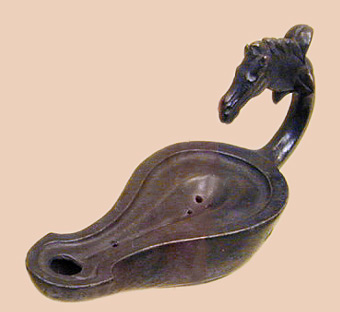
aenea lampas
 |
The Romans had a number of words for the portable oil lamp that made possible after-dark activity, whether one went abroad or remained indoors to eat, socialize, read, walk about, or work, e.g., lampas, lucerna, lanterna. These containers might be constructed of terracotta or metal, be variously shaped or elaborately decorated, but their basic elements were the same, consisting of a closed well to hold olive or perfumed oil, one or more wicks (see Martial's humorous Epigrammata 14.41, on the lucerna polymyxos), and a holder (see lantern for details).
Lamps could be carried, as Umbricius describes here, hung from the ceiling singly or in clusters, placed severally on a short branched table candelabrum, or set on a platform atop tall floor candelabra, which might be of wood (Petronius, Satiricon 95, and, warning caution, Martial, Epigrammata 14.44), marble, or metal. Their widespread use by the well-to-do is evidenced by the numbers of lamps found in villas in Pompeii and Herculaneum.
 |